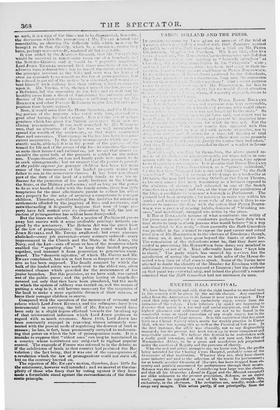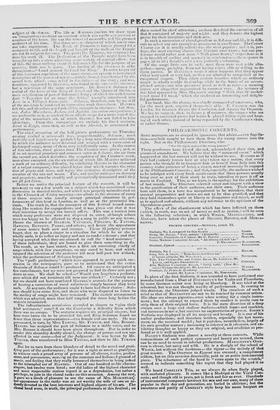EXETER HALL FESTIVAL.
We have long thought and said, that the right impulse to musical taste i;1 this couatry will be given by the middle classes. Any combined eillet from the Aristocrecy in its favour it were vain to expect. They extol that only which they can exclusively enjoy, secure from the intrusion of the vetler. 'I heir inferiors (in rank) are beginning to discover that music is a rotimal and social enjoyment, and that its highest pleasures and smbliinest efforts are not to he found in the wonderful voice or rapid execution of any single singer, but in the cembined exertion of large masses. It is this conviction that has given Erth to a Choral Society which meets for weekly practice in Exeter Hall, whAlce has sprung this as well as the Festival of last year. Itt the first instance, the aff:ir was clumsily, not to say disgracefully maaagt,d; but the present has been taken up by more competent and respectable persons. We believe this festival to be undertaken with a really good intention, and that it will not turn out, like that of Westminster Abbey, to be a gross and scandalous job perpetrated under the sanction of Royalty and the pretence of charity. Who the real and active managers are, we know not, but, time profits being intended for the Charing Cross Hospital, probably some of the Governors of that institution. Whoever they are, they have shown some industry and zeal in the selection of the music for performance; for at length, Hoother Orarorio of HANDEL has been dragged from ob- scurity and publicly announced for performance through their means. 'Solomon was the one selected. Considering how large was the choice, and that all his Oratorios (Israel in Egiipt and the Messiah excepted) are alike unknown to the present generation, Solomon, as an entire work, cannot be regarded as one of his hest. Its strength lies, exclusively, in the choruses. The recitatives are, usually, weak—the songs very meagre. This arises partly, if not principally, from the subject of the tbaina. The life o: S 'hnna (un'ess we draw upon ou: imagination) coetaius no 'evident whir It csn excite Rey passion or
emotion of the heart. He was the wisest ef num:v.0%s, :red the greatest
architeet of his time. Het these are sir •• Ileneies of which Can- not take cognizance. The Bsok of Proverbs is barren ground for a composer to till, and the length end Inass:t It of the ostIls of the Temple are not fit subjects for song. The poet ( I!r. Moutos., we NonilOse ) has done his work ill. 'nut Deditiation of the Temple might have been wrought r.O into a seem admitting some variety of musical effeet but of this, the most striking event in Solomon's life for the purpose of an oratorio, little use is made. The burden of the choruses is alike throughout—" Israel praised 1; t and the Kiug." In order to get rid of this incessant repetition of the same hetae, an episode is introdueed descriptive of the !lower of !webs—which, thoueli imairthorized by the sacred text, afford; some relief to the dulness of the story; and was, doubtless, sugaiested by HAN 3t. I., who foam] in the f.tte:•vs,:k'c cliora-es but a repetition of the same *y1%611410. 13t 1TEIS Sottowit is a recital of the loves of the King of Israel and the (..2iteen of Sheba--a mere versilieution of pert of Solomon's Song ; of which the well- I: nown duet " Together let us range the fields," (usually introduced into Lore in a Viltage,) form: purr. ,:.In, mll, therefore, can by no skill of the nisi ician be rendered an home...tine work thro!Ototit. HANDEL felt this, and therefore it forth ell his strength in ehornses : but S'oni- eon, Judas .illnecobeens, .1•Thi ha. (as entire taenpositionso are preferable to it, as each of thorn affords Setille for a more varied dis- play or the musician's art, of which 1IAND■11. bassoon Etiled to take
advantage. From this comparison we exclude his finest oratorio, Israel in Elm, since that, as well as the Messiah, is announced for performative. The chief attraction of the half-guinea performance no Thursday evening (called a rehearsal) was, unquestionably, Solomon ; most foolishly and iejtslivioasly prelude 1 by a long miscellaneous selection, by which the audience were detained and wearied with a succession of hackneyed songs, many of them very indifferently sung. In the course of this selection, three pieces from The Creation Wert: given ; nod, as if to set musical propriety and comanna sense at defiance, the air from the second act, which describes the compiction of the Creator's work, man atone excepted, (in the exscution of which Mr. Macros achieved a work of no ordinary difficulty, by exhibiting HAYDN in the character of a vulgar composer,) was placed beAre that which narrates the crea- tion of plants and trees, and lwjbrc the recitative descriptive of the creation of the sun and moon. This, and similar outrages on decency and propriety, must be steadily and systematically denounced until they are all put down.
Before we notice the principal feature of the concert, it will be necessary to say a few words on a subject which has occasioned some discussion in musical circles, and which was properly animadverted on in the Chronicle of Friday morning—we allude to the absence of many of those singers who usually occupy principal situations in per- formances of this kind in London, as well as at the provincial fes- tivals. The truth is, that the managers of this festival issued some- thing like tenders for engagerdents, and it was given out that it was their intention to accept the lowest offers. This was n contest into which many professors were nut disposed to cutter, although others were too happy to be allowed to sing a song in public on any terms. Hence the absence of Baanast, VAUGHAN, PHILLIPS, E. TAYLOR, HAWKINS, BENNETT, PARRY, and others; and hence the appearance of some names both new and strange. These ill-judging persons forget, that to place a singer in a situation for which he or she is wholly unfit, is to inflict an injury and not to confer a favour ; and that having accepted what they are pleased - to call the " kind assistance " of these individuals, they are bound to give them something to do. The result, as we have stated, was a first act consisting chiefly of songs which, with few exceptions, no one cared to hear, and which fatigued the attention of the audience tiil near half-past ten o'clock, when the performance of Solomon began.
The "puffs preliminary" which have appeared in pretty quick suc- cession in the newspapers, gave us to understand that the entire
Oratorio of Solomon would produced. Of course we anticipated a few curtailments, but we were not prepared to find its three acts pared down to one. We shall be asked—" Would you lengthen a perform- ance which did not terminate till near one o'clock ?" Certainly not ; but we should not have mutilated HANDEL'S oratorio for the purpose of hearing a succession of vocal volunteers simply because they were such. At any rate, the audience ought to have had their choice : Solo- mon should have come first, and those who were disposed to liken to the medley of songs might have remained. The fOulish arrangement which was adopted, more than half emptied the room long before the oratorio terminated.
The indiscriminate permission accorded to singers to "give their kind assistance," entailed on the Conductor a diffieulty from which there was no escape. The oratorio requires six principal singers, but here were twice six to be provided for, and King Solomon found no fewer than three representatives—two female and one male. He was personated, in turn, by Miss TIPPING, Mr. Teitanat, and Mrs. Brsuoe. HANDEL has assigned the part of Solomon to a treble voice, and to Mrs. Busnoe it should have been given throughout. But in order to render this absurdity doubly absurd, the change of person and sex was effected in one scene—that of the Judgment: it was begun by Mr. TURNER, then transferred to Miss TIPPING, and then to Mr. TURNER again.
But let us turn from these blunders of detail to the novel and grati- fying part of the performance; for it was a sight as novel as gratifying to witness such a proud array of persons of all classes, trades, profes- sions, and persuasions, meeting on the common and hallowed ground of music, and feeling that they really honoured themselves in being yoked
to the triumphal car of HANDEL. Out of one hundred treble chorus-
singers, but twelve were hired; nor did ladies of the highest character and most respectable station regard it as a degradation, bunt rather a
privilege, to join in the choral ranks on this occasion. Among the rest, it gave us a throb of pleasure to see the name of Mrs. MOSCHELES.• her appearance in the ranks was an act worthy the wife of one so ar- deadydevoted to the best interests and highest objects of his art. The choral band were, in truth, the principal performers at this festival ; on them rested its chief attraction; on them devolved the execution of all that it contained of majesty and tri,:ht : and they deserve the highest praise for their intentions and their acts. In such u succession of choral grandeur as Sol:mon unfolds, it is din- cult to select any one example as prominent in excellence. TheCenser Chorus (as it is usually called) was the most popular : and it is, per- haps, the most exciting chorus that II ANDEL ever wrote ; but our pre-
ference would rather rest upon With pious hearts," stupendous as it is in breadth of outline and inaster:y iu combination—the n.sponse in pages tr.,6' to :SS ( Arnold's edit.) was perfectly enchanting. Of the songs little can be said : most them were east aside alto- gether—many, probably, from not having voices able or willing to do them justice. In HANDEL'S songs it often happens that they appear
either very good or very bad, as they are allotted to competent or in- competent singers. They often contain beauties which en ordinary
singer is wholly unable to develop, while in rite bands of an accom- plished artist—one who possesses mind as well us voice-.a meaning comes out altogether unperceived by common eyes. An instance of this kind appeared in Aliss \1A-SON'S htaesiug " With thee Ilk' unshel- tered moor Ill tread," which she rendered an interesting :tad delight- ful performance.
he band, like the chorus, was chiefly composed of amateurs; who, for the most part, acquitted themselves ably. F. CRAMER was the Leader, Sir Gramm: SMART the Condoctor, and ADAMS the Organist. We beg to suggest, that, in future p rf 'nuances, the singers who are engaged in concerted pieces bad better b pliwerl within sight and hear- ing of each other, instead of being separated by the Cutiductor's chair, or rather throne.



























 Previous page
Previous page